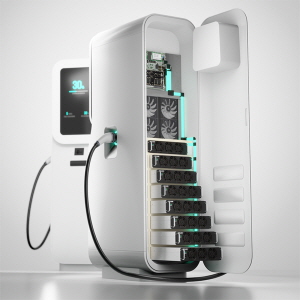솔루엠이 국내 최초로 전기차 충전기 핵심부품인 파워 모듈(PSU)에 대해 CE 인증을 획득하며, 조단위의 수출길을 개척했다.
고장 식별 쉽고 뛰어난 내열성 특징, 中 ‘대체’ 기대

솔루엠(대표 전성호)이 ‘조단위’ 시장의 전기차 충전기용 핵심부품에 대한 CE 인증을 통해 수출길을 개척하는 쾌거를 거뒀다.
솔루엠은 국내 최초로 전기차 충전기 핵심부품인 파워 모듈(PSU)에 대해 CE 인증을 획득했다고 18일 밝혔다.
국내 업체 주도로 전기차 충전 인프라 제품들이 세계 충전 시장에서 두각을 나타내고 있지만 정작 전기차 충전기의 심장부에 해당하는 파워모듈(PSU)은 아직까지도 중국에 크게 의존하는 실정이다.
특히 급속충전기의 경우 핵심부품인 파워 모듈은 충전기 원가의 40%를 차지할 정도로 고가의 부품임에도 불구하고, 중국 제품 의존도가 사실상 100%에 달한다.
충전기의 출력과 직결되는 만큼 고성능과 고신뢰성이 요구되는데, 소비자 피해를 최소화하고 안정된 공급망을 구축하기 위해서는 파워 모듈 국산화가 절실한 상황이다.
이러한 시장 환경에서 솔루엠의 고속 충전용 30kW 파워모듈이 CE인증과 KC 인증을 동시 획득한 것은 고무적이라는 평가다.
이번 인증이 향후 국내 유수의 충전기 업체들이 품질과 성능을 한 단계 끌어올리는 촉매제가 될 것으로 업계는 기대하고 있다.
또 솔루엠의 고속 충전용 30kW 파워모듈은 시중에 판매되는 중국산 제품이 가진 고질적인 문제들을 해결했다는 데 의의가 있다.
외부 온도가 높아지면 출력 효율이 떨어지는 타사 제품과 달리 내열성이 우수해 최대 60도에서도 고출력 파워를 낼 수 있고, 기존 제품 대비 슬림하고 컴팩트해 전기차 충전기 사이즈를 줄이는 데에도 효과적이다.
그럴 뿐만 아니라 차세대 전력반도체인 SiC FET를 적용해 최대 효율 96% 이상을 보장한다. 게다가 모듈에 각각 별도의 ID를 부여해 다수의 파워모듈이 들어가는 파워뱅크에서도 불량 모듈을 즉각 찾아내 바로 교체가 가능하다는 점이 주목할 만하다.
한 업계 관계자는 “상대적으로 늦게 개발에 착수했음에도 불구하고, 성능은 물론 신뢰성까지 갖춘 고속 충전기용 파워모듈을 가장 빠르게 완성할 수 있었던 데에는 솔루엠이 보유한 High-power 설계와 소프트웨어 기술이 바탕 됐을 것”이라고 설명했다.
이번 인증을 통해 내수와 해외시장 모두 진출 기본 요건을 갖춘 솔루엠은 신규 고객사 확보에 주력하는 모습이다. 최근 글로벌 완성차 업체와 충전소 구축 및 충전기용 파워모듈 양산을 위한 협의를 활발히 진행 중인 것으로 알려졌다. 이 외에도 기존에 ESL 사업으로 확보한 리테일 업체나 현지 충전 사업자 등 사업모델 협력을 지속하고 있다고 회사는 밝혔다.
또한 솔루엠은 UL(미국안전규격인증)까지 연내 취득해 글로벌 진출에 박차를 가한다. 멕시코 신(新)공장이 완공되면 전기차 충전기용 파워모듈 매출 확대에도 탄력이 붙을 것으로 예상된다.
글로벌 시장조사기관 큐와이리서치는 글로벌 파워모듈 시장 규모가 2025년 22억3,300만달러(한화 약 2조9,600억원)로 연평균 33.5% 성장할 것으로 전망했는데, 이는 시장 선점 시 조 단위 매출이 보장되는 셈이다.
유동균 솔루엠 파워사업부장(전무)은 “솔루엠은 오랜 연구개발을 바탕으로 High Power 역량을 쌓아 왔고, 축적된 기술 노하우를 최대한 발휘할 수 있는 시장이 ‘전기차 충전기용 파워모듈’이라고 생각한다”며 “이번 CE인증을 통해 해외 진출의 교두보를 마련한 만큼 연내 30kW 파워모듈을 양산하고 내년 상반기까지 고용량 모델인 50kW 파워모듈을 출시함으로써 신사업에서도 매출 신장을 이룰 것”이라고 강조했다.
 솔루엠(대표 전성호)이 ‘조단위’ 시장의 전기차 충전기용 핵심부품에 대한 CE 인증을 통해 수출길을 개척하는 쾌거를 거뒀다.
솔루엠(대표 전성호)이 ‘조단위’ 시장의 전기차 충전기용 핵심부품에 대한 CE 인증을 통해 수출길을 개척하는 쾌거를 거뒀다.